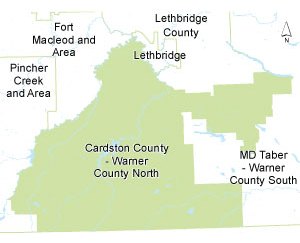Living, Loving and Laughing in the First 2000 Days
 |
Community at a glance
Located in the Southwest corner of Alberta, close to the U.S. border, Cardston County- Warner County North has a population of just under 20,000 residents. The area is home to a strong Mormon community, which dates back to Mormon settlers from the U.S. who arrived in the late 1800s. It is also the home of the Blood Tribe or Kainai First Nation.
EDI baseline results
EDI baseline results show that young children in this community are generally developing better than across the province. About 24 per cent are experiencing great difficulty in one or more areas of development, fewer than the provincial level of 29 per cent.
Strengths
- Strong faith-based community values emphasize the importance of families and healthy early childhood development.
- Parents are involved in the coalition.
- A town councilor from Magrath has been assigned to the coalition, attending meetings and facilitating communication with local government. Requests have been made to neighbouring town and village councils to provide representatives as well.
- Community members often hold positions in several organizations, which makes it easier to access and receive support from a variety of sources.
Challenges
The large rural population and spread out towns make it difficult to bring people together as a coalition with common goals and priorities.
Coalition action
- Sub-coalitions: Four sub-coalitions (Magrath, Cardston, Raymond and Stirling) are being created to address the needs of different subcommunities.
Associate members: Community members who are too busy to attend regular coalition meetings but are still interested in providing their input are offered associate membership status. Agencies that are not able to attend meetings but work directly with young children and families (for example, kindergarten teachers, Alberta Health Services staff and mental health specialists) are kept up to date through e-mail and called upon when their expertise is needed. - Monthly education forums: Speakers are invited to address various issues related to early development, such as Dr. Robbin Gibb, an expert on brain development from the University of Lethbirdge.
- Participation of children: To celebrate National Child Day in November 2013, students in Kindergarten, and Grade 1 and 2 created art work depicting what they love about their community. The coalition made banners out of the art and exhibited these in stores, the library and other public places.
- Community events: The coalition set up a display booth with activities for parents and children and information on child development at a community awareness event in November 2013. Service providers and agencies in the community, such as the Cardston Health Centre and Cardston Library, were represented at the event.
- Future plans: A reading program that would pair grandparents and preschoolers is in the planning stages. Local library staff and kindergarten teachers are providing their expertise. Communication technology is being explored as a way of bridging the geographical distances.
"Because our communities are geographically spread out, it was decided to develop sub-coalitions to address the diverse needs of each area. A 'one solution fits all' project would not enable us to provide appropriate services and resources to each community."
Denise Norton, coalition coordinator
Contacts
Facebook Page: Laughing, Loving and Learning, https://www.facebook.com/pages/Laughing-Loving-and-Learning/233401100156159
Posted April 28, 2014
